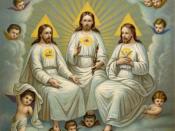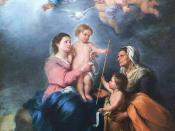Origen's doctrine of the Trinity is an attempt to maintain the monotheistic nature of God in the light of the existence of Father, Son and Holy Spirit. The influence of middle Platonism upon his teachings forces Origen to emphasise the totally transcendent nature of the Father and explains that the existence of the Son the incarnate word and the Holy Spirit are his means for interaction with the earth. However, the "necessary" limitations upon the divinity of the Son and the Holy Spirit in order to interact with the earth and carry out God's graceful work strongly imply inferiority to the Father. Origen is successful in showing that this does not threaten the unity of the Trinity, however Origen does not maintain equality between the personages. Thus in the subordination of the three persons of the Trinity it might be said that Origen is displaying elements of heresy.
As is previously stated Origen is at pains to maintain the transcendent and incorporeal nature of God the Father. In Peri Archon the first statements on his treatise are about maintaining the incorporeality of God. Origen's basis for this is Scripture, which describes God as light and fire, which are incorporeal and untouchable. The understanding such that,
"God therefore must not be thought to be any kind of body nor to exist in a body but to be of simple intellectual existence admitting in himself no addition whatever so that he cannot be believed to have in himself a more or less but is unity of may I say "oneness" throughout and through him originates all intellectual existence of mind".
The nature of God as totally transcendent would prevent any direct interaction with the world, however God is not lazy, he interacts with the world through the Son and the Holy...


